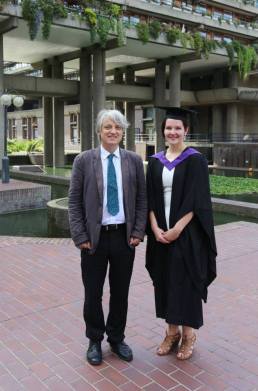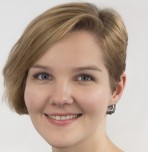 In today’s #MyCareerStory, Amara had the opportunity to interview Gabriele Butkute. Gabriele currently works as a Science Policy Assistant at the Royal Society of Biology and the Biochemical Society and in this insightful interview helps to demystify an often overlooked pathway for science graduates. Enjoy!
In today’s #MyCareerStory, Amara had the opportunity to interview Gabriele Butkute. Gabriele currently works as a Science Policy Assistant at the Royal Society of Biology and the Biochemical Society and in this insightful interview helps to demystify an often overlooked pathway for science graduates. Enjoy!
APH: Can you tell us about your educational background and career progression to date?
GB – I’m originally from Lithuania, which is where I completed my high school diploma cum laude. Soon after my graduation I came to London, had a gap year working in the hospitality business – which is really what people say when they worked as a waitress/waiter! I then embarked on a BSc Biomedical Science degree at London Met, from where I graduated almost two years ago now. Right after my graduation I got a fixed term job as an Events and Administrative Assistant at the Royal Society of Biology where I was tasked with organising three national Life Science Careers Conferences. Looking back, it seems ironic that I got this job when I didn’t have a clear career plan for myself! My next job was a Student Enterprise and Marketing internship at London Met where I spent seven months developing and integrating enterprise into the science curriculum and encouraging students to develop softer skills and business awareness which are key for a successful career nowadays. Finally, a year ago I started my first science policy job at the Royal Society of Biology and the Biochemical Society, which is where I am now. I believe in internships and placements because I undertook two between completing my degree and starting my current job. My experiences made me feel more comfortable with the career decision I have made.
You obtained a first class degree in Biomedical Science. Did you ever consider a career as a biomedical scientist in the NHS?
Of course! That was my initial plan – to work in a hospital lab in the NHS, that’s the image I had in my head when I started the degree. And boy did that image change with time! It changed because let’s be honest, how many people really know their abilities and career aspirations at the age of 18, when most of us start university? Very few. University years should really be about developing skills and knowledge that can be translated into different career pathways. It should be about discovering what you are really good at which isn’t always what you thought you ought to be good at. It’s often a very hard realisation that what you believed to be the best career for you for years, may not make you happy.

Do you believe that there is often a narrow focus with regard to the career pathways available to science graduates? If yes, do you have any thoughts on how stakeholders – Higher Education institutions, employers, students – can overcome this?
Yes, I would broadly agree with this statement and actually, it has been acknowledged in the recently published Wakeham Review on STEM graduate employability. Some of the findings included graduates lacking softer skills and commercial awareness and not sufficiently engaging in career planning. Accreditation plays one of the key roles too, as it facilitates with conversations between the HEI and employers. I think it is really about all stakeholders supporting each other because at the end of the day, they are all aiming for the same – graduates who are ready and have the right skills to join and thrive in the workforce.
Back to discussing about science policy. What is science policy?
It’s like the behind the scenes science, the work that needs to be done to support the science community and ensure their voices are heard. It is the combination between scientific knowledge and understanding of government and policy making to ensure that legislation has an appropriate evidence base. To be involved in policy you don’t have to have ‘policy’ in your job title – it is crucial that researchers engage with the policy making process.
What does a ‘typical’ working day look like?
There is rarely a typical day. I work on several topics such as supporting diversity and equality in STEM; in particular supporting people who are returning to work after a long career break; I also work on antimicrobial resistance, industry-academia partnerships, in addition to creating newsletters, responding to consultations, organising events, writing reports, blog posts and engaging on social media.
In your opinion, what are essential skills and personal attributes required to excel in your current role as a Science Policy Assistant?
The previous question should indicate that time management, ability to adapt, to prioritize and re-prioritize is essential. Communication skills would definitely be at the top of the list as well, as there is a lot of interaction with different stakeholders – from the Society’s Council members to politicians and colleagues – therefore one needs to be able to communicate effectively. In terms of personal attributes, I think they are similar to many other careers: be curious and interested, thrive on challenges rather than be intimidated by them, be organised. I love color-coding and each bigger project that I run starts with writing what I call ‘a battle plan’, which is really just a more fun and colourful version of a project timeline.
What do you like the most and what do you find the most challenging about your role?
I really enjoy the diverse range of issues I have the opportunity to work on. I face a lot of high level interactions in my job and although this is often challenging, it is also very rewarding when I am treated as an equal at a meeting comprising mainly of senior scientists or policy professionals. I also enjoy writing blog posts and articles for the magazines for both societies. The most challenging aspect of my work is juggling different projects at the same time. Prioritizing and keeping to-do lists becomes essential!

Do you have any mentors?
I don’t have any mentors as such but having two line managers and two sets of colleagues has been really useful for my career development. Having supportive senior colleagues can serve in replacement of a mentor. It is very important to have someone you can talk to, not only about the task at hand but about your career and its progression in more general terms. I have been very lucky as I work with a supportive and welcoming team where I can have these discussions. I am open to having a mentor in the future as I see the potential benefits.
Mentoring is also beneficial to the mentor just as much as the mentee. My first experience in a supervisory role working with one of our interns provided me an opportunity to learn about myself; how to work with people, how to motivate them.
When you reflect on your career to date, is there anything you wish someone had told you before you embarked on your professional journey?
During my degree, I was not aware science policy existed as a viable career option and there was little discussion about careers outside the lab. I was only aware of teaching and probably, science communication. It was during my internship at the Royal Society of Biology, organising and executing three Life Science Careers Conferences that I found out about different career pathways available to life science graduates e.g. intellectual property law. Who would have thought about it?
I also wish someone had told me to have faith in myself.
During my degree, I was always thinking about that one perfect job for me (I think most students think this way), how to find what you like and that’s just almost an impossible task while you are still sat at the university lecture theatre. While it is important to constantly improve and upskill, you have to believe in yourself and take opportunities as they come, even if they are not exactly what you thought you would be doing (often they turn out a lot better!). There is a cultural shift and people are more open about careers, I think. However, I’ve myself been faced with remarks from my peers who would say “So you didn’t make it into the lab? They didn’t pick you?”. It’s upsetting when not being in the lab is seen as ‘not making it’, but luckily there is more and more awareness now.
What achievements are you most proud of? Have you made any mistakes you are happy to share and what did you learn from them?
I am pleased that I took up the internships I did and am proud of having secured a permanent role doing something that I love. It’s always nice to know you are trusted by your manager and team to represent them at a meeting. During the first month of my job, I was sent to Dundee to organise a meeting on antimicrobial resistance for 85 senior delegates! I was responsible for running the event on the day and it went really well. Even though it was almost a year ago now, I remember the sense of achievement I felt on my way back to London.
There are times things don’t go well. When I started my current role, there were a lot of firsts and I had to learn on the job. When you make a mistake, be open about it. At University, I was very self-sufficient – wanting to do everything by myself. This did work at University as the worst that could have happened was that I failed the work at hand and that would only affect me. When you get a job, there is a new level of responsibility – for your team and for the organisation. One of the most difficult psychological moments I had in my job was when I admitted at the challenges I was having with a specific project at a committee meeting! I gathered all my courage and discussed with my colleagues and they were really supportive and provided a lot of ideas! That was a step up for my professional development. I think a lot of achievements like that are quiet ones, the seemingly little things that you overcome and they end up making quite a difference on your career and how you see yourself progress in it.
Finally, and just as important, how do you maintain a sense of balance while juggling your different roles – both personal and professional?
Balance varies. There are weeks where I spend more evenings at work related events but others when I go home at 5pm. It can be tricky but it is important to fully commit to the task at hand.
 Gabriele is a contributor to the Hub and has previously written about career options outside the laboratory for life science graduates. She writes at gabrielebutkute.com and @gabrielebutk.
Gabriele is a contributor to the Hub and has previously written about career options outside the laboratory for life science graduates. She writes at gabrielebutkute.com and @gabrielebutk.
Thank you so much Gabriele, for sharing your #MyCareerStory with us. If you enjoyed reading this article, please share and subscribe to our network! Would you like to share an article in The Hub? We would love to hear from you. Please get in touch – info@aspiringprofessionalshub.com.

Reblogged this on Bio & Beyond and commented:
Thanks, Amara, for interviewing me! Happy to share my experience on getting into science policy.
LikeLike